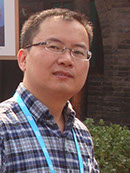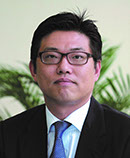
Copyright © Shanghai Municipal Tourism Administration
Workshops
1. The 2nd International Workshop on Affective and Sentimental Computing (ASC 2018)
• Organizer: Tak-Lam Wong, Fu Lee Wang, Tianyong Hao, Wei Chen, Haoran Xie and Xiaohui Tao
• Date: January 15, 2018
• Website: http://bigcomp-asc.org
As the rapid growth of user-generated data from social networks, wikis and social tagging systems, it is necessary to understand the high-level semantics and user subjective perceptions from such a large volume of data. Emotions or sentiments are one of the most important aspects as the user-generated data are always with emotional loads of their creators. Along with the development of the computational techniques for sentiment analysis and opinion mining, the increasing psychological and cognitive models/theories are exploited for modeling sentiments and emotions by incorporating with social computing techniques such as social network and personalization, mining user reviews, user profiling in social network and so on. Connecting affective/sentimental models and social computing techniques not only can facilitate the understanding big data in at semantic-levels but also improve the performance of various social computing applications in the big data era. It combines affective/sentimental models with social computing as a promising direction and offers opportunities for developing novel algorithms, methods and tools.
The 2nd International Workshop on Affective and Sentimental Computing (ASC 2018) in conjunction with the 5th IEEE International Conference on Big data and smart Computing (BigComp 2018) will bring together the academia, researchers, and industrial practitioners from computer science, information systems, psychology, behavior science, and organization science discipline, and provide a forum for recent advances in the field of sentiment analysis, affective computing, emotion detections, and opinion mining from the perspectives of various computing techniques.
2. The First International Workshop on Dialog Systems (IWDS)
• Organizer: Young-Seob Jeong and Ho-Jin Choi
• Date: January 15, 2018
• Website: http://sigai.or.kr/workshop/bigcomp/2018/iwds/
This workshop aims to create opportunities to discuss about the state-of-the-art studies, and to share on-going works. We hope that this will enhance collaboration among the researchers related to dialog systems. There are many challenging issues, such as out-of-domain detection, distant voice recognition, and end-to-end systems. We want to discuss about how to solve such issues, and share the experiences of applying the dialog system to real-world applications.
3. The 1st International Workshop on Driving Computing Platform for Autonomous Vehicles (DrivComp 2018)
• Organizer: Young-guk Ha and Sung-hoon Kim
• Date: January 15, 2018
• Website: http://sclab.konkuk.ac.kr/drivcomp2018
Driving Computing Platform (DrivComp) is a development workbench technology for high performance computing system and application system for autonomous vehicles that provides high-speed real-time processing of large-volume data obtained from various vehicle sensors and real-time situation assessment. In this workshop, we would like to discuss research outcomes of DrivComp project, consisting of hardware platform, software platform, driving situation reasoning, recognition of road mark and traffic signs, and vehicle control system.
4. The First International Workshop on Big Data Analysis for Smart Energy (BigData4SmartEnergy 2018)
• Organizer: Ho-Jin Choi, Chan-Hyun Youn, Kyuchul Lee, Jinho Kim, Eenjun Hwang, and Sung-Bae Cho
• Date: January 15, 2018
• Website: http://sigai.or.kr/workshop/bigcomp/2018/big-data-for-smart-energy
AI-based smart energy deals with the challenges of using big data and AI techniques for the efficient management of energy resources and facilities, the timely detection of energy problems and anomalies, and the effective prediction of energy demands and services in the future, hence has already become an important area of research in many countries. This workshop aims to create opportunities to share on-going works in smart energy industry and academia, to enhance collaboration between energy researchers and data scientists, and to foster new innovations of AI, big data, and smart computing technologies in such areas as smart energy platforms and infrastructure, monitoring and analysis of energy big data, customized demand forecast in smart cities, smart homes, and electric vehicles, new innovative energy services, and so on.

Event Cube: a Conceptual Model for Multi-sourced Event Discovery and Analysis
Qing Li
Professor
the City University of Hong Kong
Abstract:
The publicly available data such as the massive and dynamically updated news and social media data streams (a.k.a. big data) covers the various aspects of social activities, personal views and expressions, which points to the importance of understanding and discovering the knowledge patterns underlying the big data, and the need of developing methodologies and techniques to discover real-world events from such big data, to manage and to analyze the discovered events in an efficient and elegant way. In this talk we introduce techniques of discovering events from the multi-modal big data and building an event cube model to support event queries and analysis, by addressing the tasks of data cleansing, data fusion, event detection and modeling. Preliminary experimental results on some of the tasks will be reported. We further explore and connect the important events discovered in a multimodal collection of inputs from various public sources, uncover their co-occurrence and track down the spatial and temporal dependency to answer the challenging questions of "how" and "why". A novel event cube (EC) model is devised to support various queries and analysis tasks of events; such events include those discovered by techniques of untargeted event detection (UED) and targeted event detection (TED) from multi-sourced data. More specifically, based on essential event elements of 5W1H, the EC model is developed to organize the discovered events from multiple dimensions, and to operate on the events at various levels of granularity, which facilitates analyzing and mining hidden/inherent relationships among the events effectively.
Bio:
Qing Li is a Professor at the Department of Computer Science, and the Director of the Engineering Research Centre on Multimedia Software at the City University of Hong Kong, where he joined as a faculty member since Sept 1998. He received his B.Eng. from Hunan University (Changsha), and M.Sc. and Ph.D. degrees from the University of Southern California (Los Angeles), all in computer science. His research interests include multi-modal data management, conceptual data modeling, social media and Web services, and e-learning systems. He has authored/co-authored over 400 publications in these areas. He is actively involved in the research community and has served as an associate editor of a number of major technical journals including IEEE Transactions on Knowledge and Data Engineering (TKDE), ACM Transactions on Internet Technology (TOIT), Data and Knowledge Engineering (DKE), World Wide Web (WWW), and Journal of Web Engineering, in addition to being a Conference and Program Chair/Co-Chair of numerous major international conferences. He also sits in the Steering Committees of DASFAA, ER, ICWL, ACM RecSys and IEEE U-MEDIA. Prof. Li is a Fellow of IET (UK), a senior member of IEEE (US) and a distinguished member of CCF (China).
ASC 2018 Keynote Speech
BigData4SmartEnergy 2018 Keynote Speech

Time-Synchronized Measurements and Applications for Monitoring of Intelligent Electric Power Systems
Yong-June Shin
Professor
Yonsei University
Abstract:
For the future smart grid, time-synchronized measurements such as synchrophasor and advanced metering infrastructure (AMI) have been introduced into the existing power grid, which are featured by communication capabilities and higher measuring resolution contrary to the conventional measuring devices. These capabilities will enable us to monitor the grid in real-time manner for efficient and reliable operation of smart grid. In addition, these devices are considered as main sources to generate power system big data for intelligent smart energy services. This paper presents current status of time-synchronized measurements and their applications in big data. Moreover, applications and potentials in power system application are discussed when synchrophasor and AMI are time-synchronized across layers.
Bio:
Yong-June Shin received his B.S. degree from the Department of Electrical Engineering, Yonsei University, Seoul, Korea, in 1996 with early completion honors and the M.S. degree from The University of Michigan, Ann Arbor, in 1997. He received the Ph.D. degree from the Department of Electrical and Computer Engineering, The University of Texas at Austin, in 2004. Upon his graduation, he joined the Department of Electrical Engineering, the University of South Carolina as an Assistant Professor. He was promoted to Associate Professor with tenure in 2011. He joined School of Electrical and Electronic Engineering, at Yonsei University, Seoul, Korea as Associate Professor in 2012. He is a recipient of the United States National Science Foundation CAREER award in year 2008, and General Electric Korean-American Education Commission Scholarship. Dr. Shin’s current research interests are characterized by the application of novel digital signal processing techniques to a wide variety of important transient and nonlinear problems in smart electric power grid.
ⓒ Copyright 2017 KIISE – All Rights Reserved.
[KIISE] Korean Institute of Information Scientists and Engineers
#401 Meorijae Bldg., 76, Bangbae-ro, Seocho-gu, Seoul 06704, Korea
Phone: +82-2-588-9240 | Fax: +82-2-521-1352 | Email: ejmoon@kiise.or.kr | Homepage: www.kiise.or.kr
Business Registration Number: 114-82-03170
SCMember-board
